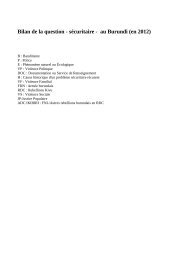You also want an ePaper? Increase the reach of your titles
YUMPU automatically turns print PDFs into web optimized ePapers that Google loves.
EXECUTIVE SUMMARY<br />
grow out of preexisting groups—such as those in Libya—would presumably<br />
be more likely to remain loyal to the Islamic State, even as resources<br />
diminish and the group comes under pressure from state, nonstate,<br />
or international actors. On the flipside, groups that only “rebranded”<br />
themselves as Islamic State provinces may be quicker to revert to a focus<br />
on their original—typically local—grievances, support mechanisms,<br />
and targets.<br />
Islamic State Libya is an outlier in that it was developed under the direction<br />
of IS leadership in Syria and Iraq. Although it has drawn fighters from<br />
the Tunisian group Ansar al-Sharia (AAS), which operated in eastern Libya<br />
before IS’s appearance on the scene, AAS has not pledged an oath to Baghdadi.<br />
In fact, some IS Libya fighters are reported to have returned to fight for<br />
AAS after IS Libya lost its safe haven in Darnah. Aaron Zelin explained that<br />
Tunisian jihadists have historically played a role in IS founder Abu Musab al-<br />
Zarqawi’s networks in the Levant, and a number of them returned to Libya<br />
in 2013 to establish a presence there. The experiences gained by these jihadists<br />
during their time in the Levant are important and point to closer ties to<br />
IS core than exist for other provinces.<br />
Operational ties between the Egypt-based Sinai Province, or Wilayat<br />
Sinai, and the core are less apparent. Despite many jihadist ideological<br />
roots in Egypt, Zarqawi had few preestablished ties with Sinai, according to<br />
Mohktar Awad. The Egyptian group Ansar Beit al-Maqdis (ABM)—which<br />
previously was primarily focused on fighting Israel—offered its allegiance<br />
to the Islamic State, possibly as early as the summer of 2014. This oath not<br />
only brought new, more deadly capabilities; it resulted in a greater focus of<br />
these attacks on the Egyptian military and possibly led to the bombing of<br />
the Russian commercial airliner. 2 The Sinai Province does not control territory<br />
outright but operates relatively unimpeded by the local population<br />
because of its accommodation of local Bedouin tribal interests. That being<br />
said, Aymenn al Tamimi explained that the group has tried to implement<br />
limited hisbah (Islamic police) activity, such as burning narcotics.<br />
Both IS and its predecessor, al-Qaeda in Iraq (AQI), have effectively<br />
exploited sectarian divisions to gain support. A number of Islamic State<br />
provinces operate in areas with sizable Shiite populations, such as Yemen<br />
and Saudi Arabia, but in other areas, such as Libya and Egypt, sectarianism<br />
does not play a significant role for local IS affiliates. So while Islamic<br />
State Yemen could potentially exploit the instability wrought by the<br />
Yemeni civil war to make advances there, internal disputes have weakened<br />
the organization. Likewise, the “Nejd Province” of the Islamic State has<br />
xvii






